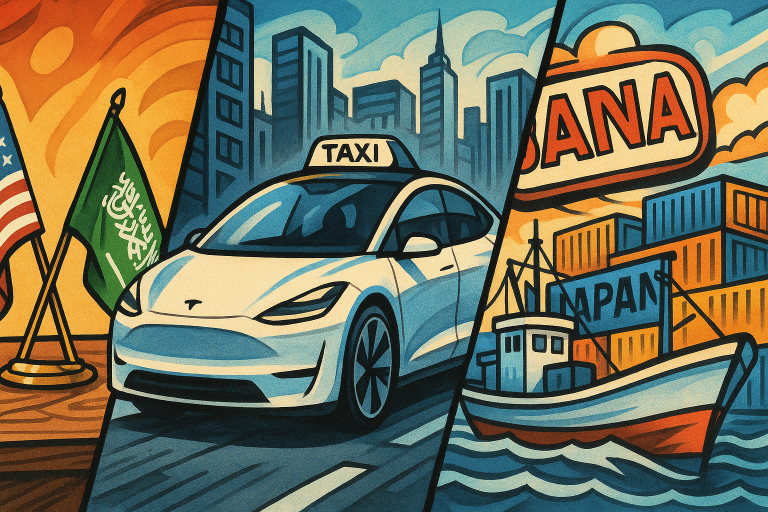On Wednesday morning, a series of major policy, business and geopolitical developments unfolded across the United States and worldwide, touching on nuclear cooperation, autonomous vehicles, regional trade tensions, and a landmark transparency measure in Washington.
US–Saudi Arabia finalize agreements on nuclear cooperation, AI and defense
The White House confirmed that the United States and Saudi Arabia have concluded a set of wide-ranging agreements covering civil nuclear energy, artificial intelligence, and defense procurement.
According to the administration’s fact sheet, the nuclear deal positions the US and American companies as Saudi Arabia’s “civil nuclear cooperation partners of choice.”
The agreement also commits both sides to ensuring that nuclear collaboration adheres to “strong nonproliferation standards.”
Beyond nuclear energy, both nations signed a framework on critical minerals and an AI-focused memorandum of understanding, granting Saudi Arabia access to US systems while “protecting US technology from foreign influence.”
Defense cooperation also expanded, with Saudi Arabia agreeing to acquire nearly 300 US-made tanks as part of a broader package that includes future deliveries of F-35 fighter jets.
Israel has been the only Middle Eastern nation operating the jets to date.
Tesla secures permit for ride-hailing service in Arizona
Tesla has received approval from the Arizona Department of Transportation to operate as a transportation network company, marking a step toward commercial robotaxi operations in the state.
The electric vehicle maker applied for the permit on Nov. 13 and was granted approval on Monday, ADOT said.
The company will still require additional permits before offering a full robotaxi service.
Tesla has also applied for autonomous vehicle testing permissions in Phoenix and currently operates pilot programs in Austin, Texas, as well as a traditional car service in the San Francisco Bay Area.
Tesla aims to remove human safety drivers from vehicles in Austin before year-end and plans to launch commercial robotaxi services in Phoenix and several other US cities before the end of 2026.
According to federal safety data, Tesla vehicles equipped with automated systems have been involved in seven reported collisions since its Texas pilot began.
Competitors Waymo and Baidu remain far ahead in commercial driverless operations, with Waymo surpassing 10 million driverless trips in the US and Baidu’s Apollo Go recording 3.1 million fully driverless rides in the third quarter of 2025.
Despite falling behind peers, CEO Elon Musk maintains that Tesla is “on the cusp” of safe autonomous driving.
China reimposes ban on Japanese seafood amid diplomatic tensions
China has notified Japan that it is reinstating a full ban on Japanese seafood imports, according to reports from Kyodo and NHK.
The move reverses an earlier partial easing of restrictions imposed after Japan’s release of treated wastewater from the Fukushima nuclear plant.
Before the ban, China accounted for more than 20% of Japan’s seafood exports.
Beijing said the renewed restrictions stem from the need for further monitoring of wastewater releases.
The decision also follows heightened diplomatic friction after Japanese Prime Minister Sanae Takaichi suggested a Chinese attack on Taiwan could trigger a Japanese military response.
The remarks prompted Beijing to issue travel warnings and led Tokyo to advise its citizens in China to increase security precautions.
Congress overwhelmingly votes to release Epstein investigation records
In a rare bipartisan move, Congress voted overwhelmingly to require the Justice Department to release all unclassified records related to the late Jeffrey Epstein.
The House passed the measure 427–1, followed hours later by unanimous Senate approval.
President Donald Trump has pledged to sign the bill.
The legislation mandates the release of all unclassified documents, including flight logs, investigative materials, and internal communications, within 30 days of enactment, allowing redactions only to protect victims and active investigations.
The vote followed months of pressure from lawmakers and survivors advocating for transparency.
Tens of thousands of records have already been turned over to the House Oversight Committee, which has made many public.
Lawmakers hailed the passage as a major step toward accountability, while survivors emphasized the need to keep the issue nonpolitical and centered on justice.
The post Morning brief: US Saudi Arabi deal and Tesla receives new robotaxi approval appeared first on Invezz

